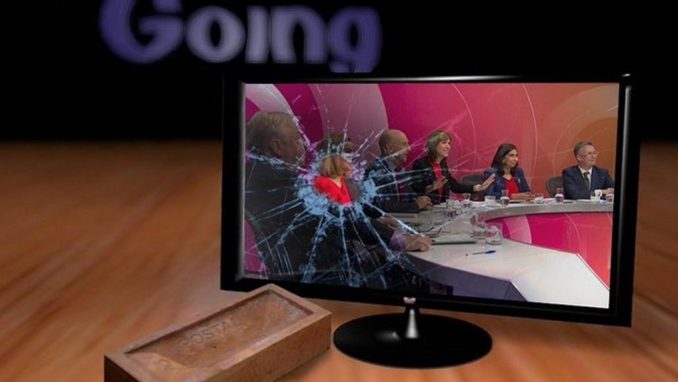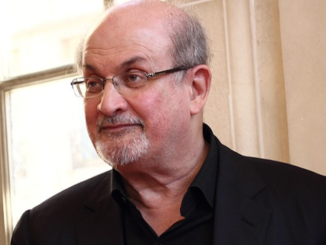
Question Time 7th May 2020
Panel:
George Eustace (Conservative)
Nicklaus Thomas-Symonds (Labour)
Afua Hirsh (Journalist)
Juergen Maier (Businessman)
Chris Hopson (NHS Providers)
Venue: Newcastle upon Tyne
Surgeon to the Royal Household and discoverer of the medical x-ray, Nobel Prize for Medicine laureate, Professor Doctor Sir Robert Peston MD FRCS FRS ITV, has been called to a village in Galilee in order to raise the dead back to life. Therfore, unfortunately, tonight’s Question Time panel does not include a medical expert.
Newcastle upon Tyne is represented by three Labour MPs, including the earnest Chinyelu Onwurah. One of the Northumberland Onwurah’s, she spends her time avoiding political issues, preferring to bash the outgoing Newcastle United proprietor, Mr Mike Ashley. A tale of whom later.
Regarding the venue, I must declare an interest. Mrs AWS is a true Geordie, born within spitting distance of the Tyne. Albeit on the other side of the river and previous to a ten-pound Pom’s prefab in Mattawatta and an English public school. As a young man, I lived in Newcastle too. Trying very hard to fit in, I attended the sporting spectacles at St James Park. Not St James’s or St James’, you’ll note. Doug Wetheral always said ‘St James’. The issue is settled. However, I found myself enquiring, of any spectator who might be armed with a little FM radio, how my local XI was doing. The empty, windswept, snow-capped terraces called me back. They say that you don’t choose your team, your team chooses you.
Many years later, your humble reviewer was an actual member of the football family. May I quote player’s agent, Mr Eric Hall?
“I don’t get 10% of their wages, they get 90% of mine.”
I must tell that tale of departing Newcastle United proprietor, Mr Mike Ashley. One day I was embarrassed by the Benwell training ground’s caterers. I only had a roll of twenties, they, no change. Mr Ashley was called over. In keeping with the nature of the man, not only was he (unhelpfully) in possession of nothing other than a clip of fifties, but he instructed me to empty my pockets.
Noting the contents, he looked at me, I looked at him, we both looked at my handful of foreign coins. Somewhat shamefacedly, I muttered in explanation,
“They go in vending machines, Mr Ashley.”
Recognising a kindred spirit, he allowed me a free burger. He will be missed.
In another terrible blow to members of the BAMEQAWS community, £15000 an hour key worker, Fiona Bruce was (deliberately?) sloppy in releasing the carrier pigeon. News of the panellists was late in reaching the Debatable Lands, making one’s research somewhat rushed. Little time remained for cycling to Companies House, dropping into the local library and newspaper office, and for sending telegrams to the Cayman Islands. If Afua Hirsh pays for her badly frizzled hair extensions through a front company in Panama, I’m afraid, dear reader, we may never find out about it.
The first question was about numbers, Margaret gave a speech rather than asked a question, the gist of which was about the number of deaths. She wasn’t proud to be British. Fiona Bruce (Chair) did mention our “highest number of deaths in Europe”, before qualifying her position towards us being second or maybe even third highest. Shall we enlighten her?
To suggest that Corvid deaths are higher here than in every other European country is completely untrue. It is a bare-faced lie. It is fake news. According to researchers at Oxford University’s, Oxford Martin Programme on Global Development (via their Our World in Data Project), up until Wednesday, May 6th, the European figures (in deaths per million) were as follows:
1st. Belgium, 691
2nd. Spain, 547
3rd. Italy, 484
4th. UK, 433
Belgium is the most badly corvid affected country in Europe. Have you seen one single item about the Belgian corvid crisis on mainstream media? No, neither have I.
Nicklaus Thomas-Symonds (Labour), as shadow minister for security, was previously under Dianne Abbott. No wonder he stays at home and talks to us via Skype. A lawyery and academic type, he is a barrister and, like horribly racially sinned against Afua Hirsh, did PPE at Oxford. Nick said that the opposition had wanted lockdown before the government, who had been too slow in introducing that lockdown. Bruce countered that the opposition said that they wanted a lockdown only a few hours before the government actually announced one.
Chris Hopson (NHS Providers) talked up the NHS’s response and praised himself for providing an extra 33,000 beds.
In Chris Hopson, rather than a medical expert, the BBC had invited a high panjandrum NHS quangocrat, a Marlborough College educated PR man.
Hopson’s CV is a Cook’s tour of government departments and political parties. He has been engaged as a; customer contact director, communication and marketing director, consultant, corporate affairs director, special advisor, strategic communications consultant and corporate communication strategist. He also writes opinion pieces for the Guardian. His present position is as chief executive of NHS Providers, who are, according to their website,
“the membership organisation for the NHS hospital, mental health, community and ambulance services that treat patients and service users in the NHS.”
Hopson is a high priest of PR. His present bishopric is the NHS. He played an interesting hand. Throughout the programme he talked earnestly and at length, avoiding political point-scoring and cliche.
George Eustace (Conservative) mentioned Germany and their testing effort. Throughout the pandemic, much has been made of the far higher number of tests and far fewer fatalities in Germany. There is a lesson to be learned. In its profile of the German healthcare system, the Commonwealth Fund notes that,
“The various levels of [German] government have virtually no role in the direct financing or delivery of health care.”
It is funded “by competing, not-for-profit, nongovernmental health insurance funds” and “substitutive private health insurance”. In other words, the German health service is absolutely nothing like the NHS, either in its funding, delivery or operation. This reviewer would advise that, at the end of this pandemic, the best possible outcome for UK patients would be the abolition of the National Health Service and its replacement with competing privatised hospitals, funded by a competitive private health insurance market, accompanied by a giant tax cut.
Juergen Maier kept on saying “we”. He thought “we” should have been doing better. He also had the builders in, with bits of scaffolding visible outside of his bedroom window. Juergen’s loyalties can best be judged from his weblog, which opens with a giant picture of his beaming self standing next to Angela Merkle. His team has chosen him. Maier recently retired after working for German multinational conglomerate Siemens for 33 years. By all means read his gushing, self-congratulatory dross, but as you do so, bear in mind that during his time at the company, Siemans was thoroughly corrupt.
I am grateful to Professor Bertrand Venard of the Audencia Business School and the Internet Institute of the University of Oxford, who provides the following via his article, “Lessons from the massive Siemens corruption scandal”, published in The Conversation.
Linda Thomsen, Director at the Security Exchange Commission described the pattern of bribery in the company as, “… unprecedented in scale and geographic reach. The corruption involved more than $1.4 billion in bribes to government officials in Asia, Africa, Europe, the Middle East and the Americas.”
Professor Venard continues;
All over the world – from Bangladesh, Vietnam, Russia, and Mexico to Greece, Norway Iraq and Nigeria – Siemens paid bribes to government officials and civil servants. The magnitude of the bribery system was widespread.
If Herr Maier pleads ignorance, remind him of the following comment from one of his own colleagues, Reinhard Siekaczek;
We all knew that what we were doing was illegal. Paying a bribe was customary in practically all business units at Siemens AG, except for business units that deals with lamps and such.
At Companies House, Siemans UK declares the nature of its business as being the manufacture of electronic components, electronic industrial process control equipment, electric motors, generators and transformers and electricity distribution and control apparatus. Ominously for Herr Maier, no mention of those (pure as virgin snow on a Berchtesgaden hillside) lamps. Not to worry, Maier remains a fully paid-up member of the great and the good, with a CBE, a host of honorary titles and seats on government quangos. Avoid.
The next question was about the app. Afua Hirsh monologued for far too long and became very animated over nothing in particular. She also monologed about the claimed disparity in death rates between different ethnic communities. Afua is one of the Akan Ghanian Hirsh’s. Like so many other authentic BBC African voices, she was raised in Wimbledon, went to public school and studied PPE at St Peter’s College, Oxford. She is a lawyer and has worked as a journalist for Sky, the BBC and The Guardian. She is published by Penguin. All of this while being horribly held back by institutional, cultural, ingrained, structural racism. Yawn vigorously while avoiding her as well. She is represented by the Troika agency in Great Portland Street, around the corner from the BBC. If you’d like to hire her then start saving up.
Given that “Hitler’s War” and “The Bell Curve” appear to be on the London media bubble reading list these days, the answers to the BAME question were rather tame.
Afua set off again, this time about protection, as lockdown might soon be raised. She wanted to be assured that she would be kept safe. Is there a pasty-faced, bespectacled, over-sexed, former epidemiology advisor, recently relieved of his duties, immune from lockdown, on the prowl and with time on his hands? Afua needs to be told.
* * *
In keeping with these strange times, when office workers never go to an office and factory workers never go to the factory, your humble reviewer is close to the point where he doesn’t actually watch Question Time. About 90% of this review has been written before the programme is broadcast. And why not? As Bruce and the panellists sleepwalk through this tired format, one feels obliged to sleep through them. Going back to my footballing days, from time to time, a treasured client in need of motivation would be hit in the face with the office football and informed,
“If you can’t be bothered, neither can I.”
Perhaps an epitaph that might choose Question Time.
© Always Worth Saying 2020
The Goodnight Vienna Audio file
Audio Player



